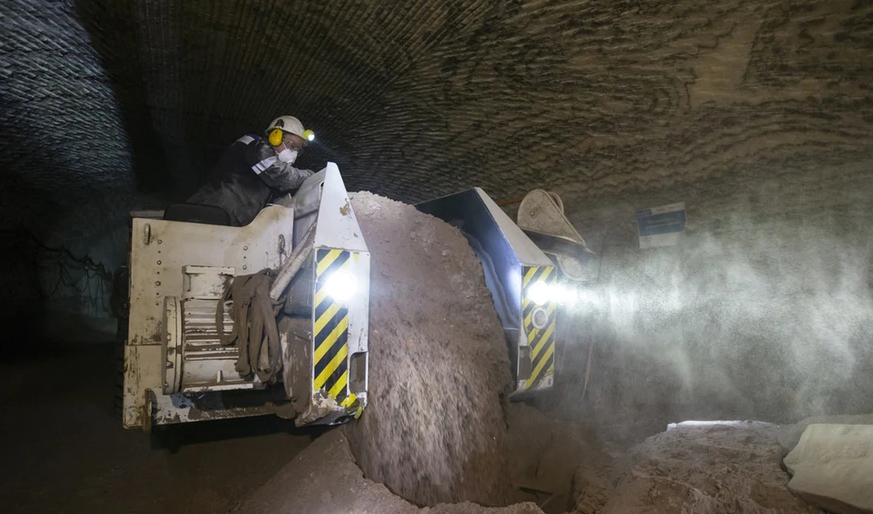
EuroChem, which achieved sales of more than $10 billion in 2021, insists it has no links to the Kremlin. Copyright 2018 The Associated Press. All Rights Reserved.
The effectiveness of sanctions against Russia have again been called into question as it emerged that an oligarch transferred his stake in a fertilizer company to his wife. The move has apparently thwarted European Union sanctions that Switzerland also enforces.
The Tages-Anzeiger newspaper says Andrey Melnichenko handed over his stake in the Swiss-based EuroChem company to his wifeExternal link Alexandra shortly before he was hit with European Union sanctions on March 10.
Melnichenko stepped down from the board of directors of EuroChem on March 9. In a statementExternal link, the company said that Melnichenho had also “withdrawn as main beneficiary”.
But it now appears that his wife was named as the new beneficial owner of a Cyprus-based trust that holds a large majority stake in EuroChem. “At the time of Mr Melnichenko’s withdrawal as a beneficiary of the trust, he was not a sanctioned person,” the couple’s lawyers told the Tages-Anzeiger.
The State Secretariat for Economic Affairs (Seco), the Swiss body responsible for sanctions, told the newspaper that it is powerless to impose sanctions against EuroChem.
Political backlash
Senior Swiss parliamentarians, such as Cédric Wermuth, co-chief of the left-wing Social Democrats and Thierry Burkart, president of the centre-right Radical party, are now demanding an explanation from both Seco and Economics Minister Guy Parmelin.
They argue that the impact of sanctions should not be blunted by such tactics that appear to circumvent the measures. Green Party parliamentarian Manuela Weichelt has demanded a legal review of the situation.
The EuroChem ownership transfer bears the hallmarks of other oligarchs conferring their assets onto relations or close friends. For example, metals and mining magnate Alisher Usmanov, who is sanctioned by both the EU and Switzerland, told the British media that he has already transferred his fortune into trusts that donated the wealth to family members.
Western governments could extend sanctions to these new beneficiaries. The United States has sanctioned the ex-wife and daughters of Russian President Vladimir Putin. But former Swiss anti-money laundering chief Daniel Thelesklaf told the Tages-Anzeiger that Western authorities are engaged in a “game of cat-and-mouse” with Russian oligarchs.
EuroChem is one of numerous commodities firms with Russian links that are based in the small Swiss town of Zug, near Zurich. It came as a surprise when the cantonal authorities said last month that they could find no sanctioned Russian firms or individuals operating in the cantonExternal link.
Commodities trade
EuroChem is not the first company to take action to avoid being hit by sanctions that are directed at their owners. In 2018, Swiss-based oligarch Viktor Vekselberg was obliged to sell his stakes in several Swiss companies, including the manufacturer Sulzer, after the US named him on their sanctions list.
But in that case, Sulzer negotiated the share buy-back from Vekselberg’s holding company Renova in full cooperation with the US authoritiesExternal link, the company told the Financial Times.
The EuroChem case also exposes the danger of sanctioning companies that supply the world with vital commodities. Several EU member states have vowed to wean themselves off dependency on Russian oil and gas, but the process will take some months to achieve. Russia also exports large volumes of grains, cereals and fertilizers around the world.
Swiss Economics Minister Guy Parmelin has warned against blanket bans on Russian produced commodities. “I am against taking measures that lead to fresh problems elsewhere and further aggravate the global crisis,” he said. “This is not just about oil and gas; it is also about food.”
Melnichenko, meanwhile, has not escaped sanctions completely, despite publicly calling for the Ukraine war to end. In March, the Italian authorities impounded his yacht that is said to be worth $600 million (CHF585 million).
Full story here Are you the author? Previous post See more for Next postTags: Featured,newsletter,Politics
























